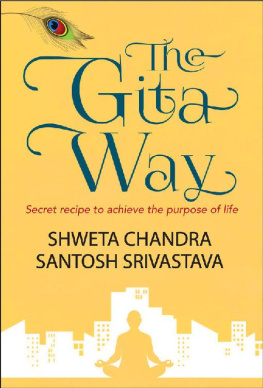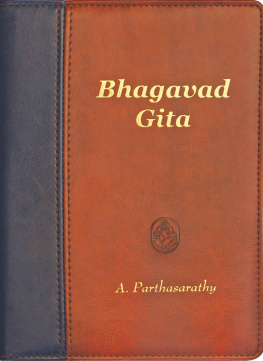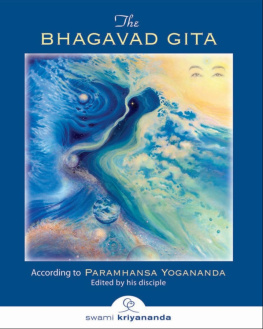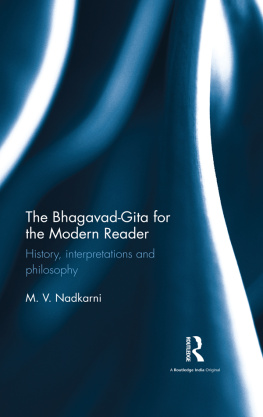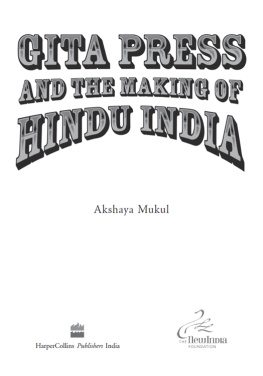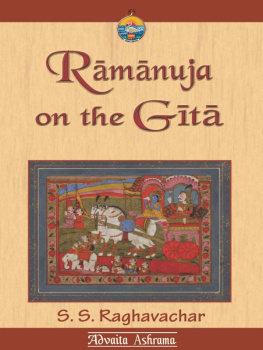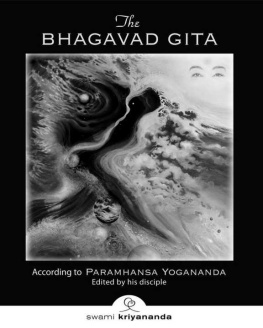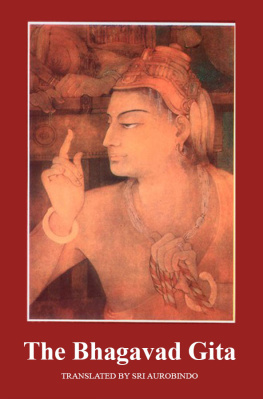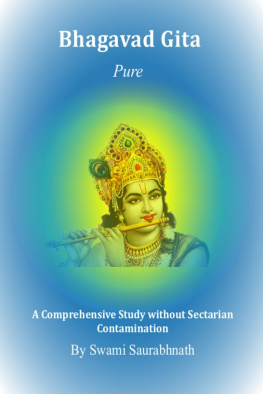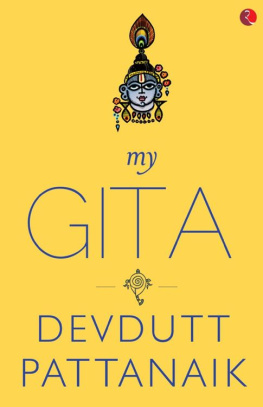Shweta Chandra , 34, a post graduate in organic chemistry, is a self-employed consultant. After working with Birla Shloka Edutech, she left the promising career in corporate world to prioritise family goals. With an inclination to learn human behaviour, she call it human science, she discovered writing on it as her full time hobby. Besides writing she is a passionate cook and a travel buff who loves travelling to places known for its heritage and cuisine. Readers may write to her at shwetachandra123@gmail.com
Santosh Srivastava , 38, an MBA from S P Jain Institute of Management and Research, Mumbai, is a marketing professional, currently heading marketing services in H & R Johnson (India) based out of Mumbai. He found himself fascinated about science of spirituality from early childhood. Along with maintaining consistent focus on professional priorities, he actively writes on various topics ranging from management to spiritualism through his blog www.santoshsrivastava.com . Besides writing, he enjoys playing chess and cricket. Santosh can be reached at Srivastava.santosh@live.com

Published by GENERAL PRESS 4228/1, Ansari Road, Daryaganj New Delhi 110002 Ph. : 011 23282971, 45795759 e-mail : generalpressindia@gmail.com www.generalpress.in Shweta Chandra & Snatosh Srivastava All rights reserved. No part of this publication may be reproduced, stored in a retrieval system, or transmitted, in any form or by any meanselectronic, mechanical, photocopying, recording or otherwisewithout the prior written permission of the publishers. First Edition : 2016 ISBN : 9789380914879 2 7 0 5 2 0 1 7 |
Contents
Preface
I am playing with moist sand and trying to make a home,
The shores are wet and the waves are near,
When I try to save home I waste time,
When I try to save time, I need time,
The sun reminds me to pack up,
With a success or without,
Because, a home of sand is not to live,
Finished or unfinished,
I have to leave,
What is the loss or what is the gain,
It is fun only if its a game.
Can the journey of life be a fun throughout? Am I wasting time making a castle of sand?
The Gita Way tries to discover the secret recipe of knowing our real self and achieving supreme purpose of life.
Chapter 1
Introduction to The Gita Way
The Gita Way is an attempt to present unconventional interpretations, derived theories and their applications based on the tenets of Bhagavad Gita. Without delving into either mythological or God-centric discourse, the book attempts to shed light on matters of self-realisation, and identifying and following the path to the individual and universal purpose of life.
There are two ways we interpret Bhagavad Gita; one, as per its role in framework of the great war of Mahabharata, the other, its importance in communicating Vedic philosophies. Lets understand these context briefly to outline the premise of the Gita Way.
The origin of the great war of Mahabharata reside in dispute between Pandavas and Kauravas. Pandavas wanted a logical solution to their fair share of Hastinapur, while Kauravas led by Duryodhana denied even an inch of the land. Both claimed that they are the real and logical successor of the kingdom. Trapped in egoistic and pseudo self-esteem, Duryodhana defied Pandavas to fight him for the crown. History reveals that war never solves a problem. Still Pandavas, led by Yudhishthira, the eldest of the five sons of Kunti, accepted the challenge. Pandavas knew that uprooting one of the biggest, established and trained army would never be easy. They had to rely on certain strengths, they were gifted with. One of the strengths was the guidance from Krishna, Pandavas cousin, and a war coach and strategist. They had power of prince Bhma too in their side. But their reliance to war outcome was centred on Arjuna, the greatest proclaimed archer of that era. For Pandavas it was a war for their rights, for Krishna it was a war for ultimate dharma , the universal goal of righteousness. Krishna, although vowed not to directly fight as a warrior from either side, he chose to mentor Pandavas. He decided to guide Arjuna just being his charioteer. Both the goals of Pandavas and Krishna were largely dependent on Arjuna, one of the greatest warrior of the side. What would happen if the key member of Pandavas camp gives up just before start of the battle?
Arjuna, just before the war, while looking at the armies of both sides comprise of his own friends and relatives, filled with elements of austerity, gave up his desire to fight. He questioned his own purpose of winning such a war in which whoever wins, ultimately he will be a loser. Thinking what he would do with the winning the crown without his own friends and relatives alive there to cheer and appreciate, he gave up his Gandiva and declared his withdrawal from the war. Krishna, symbolizing ultimate knowledge, senses the conflict within Arjuna, the conflict of a lost soul seeking a direction and a warrior seeking his purpose.
That was the origin of Bhagavad Gita, the divine conversation between Krishna and Arjuna. Krishna mentors Arjuna as a friend, counselling him in his quest to realise his supreme purpose. In the process, Arjuna realizes his goal as a warrior fighting a righteous war, and vows to fight. In Gita, Krishna also reveals the ultimate knowledge, and establishes the recipe to discover and realize the supreme purpose of humankind. The popularity of Krishna already made him a personality comparable with heavenly powers. That is why we call Gita a divine song, the scripts as said by God, the Lord Krishna himself.
The Bhagavad Gita is a guide to realise ones supreme goal of liberation through insights on dharma, supreme knowledge, holy duty, and devotion. People such as Mahatma Gandhi and Vivekananda have mentioned the Gita as an eventual source of wisdom and self-realisation. Mahatma Gandhi writes, The object of Gita appears to me to be that of showing the most excellent way to attain self-realisation. Gandhi also acknowledged the Gita as his primary source of inspiration. He once said, When doubts haunt me, when disappointments stare me in the face, and I see not one ray of hope on the horizon, I turn to Bhagavad-Gita and find a verse to comfort me; and I immediately begin to smile in the midst of overwhelming sorrow. My life has been full of external tragedies and if they have not left any visible or invisible effect on me, I owe it to the teachings of the Bhagavad Gita. Gita is a gift ancient Indian philosophies given to the world, noticeably, not only prominent Indians but also leaders in various fields across globe praise Gita for the influence it made in their lives.
The Bhagavad Gita stands for a lot more than a mere representation of Hinduism and its tenets. The insights and knowledge it provides are beyond any religious faith. It is a compilation of Vedic philosophies presented in a symbolic manner. The great war of Mahabharata is an allegory of war within ourselves. The Gita differentiates good from evil, knowledge from ignorance, and inner happiness from pleasures gained from the realisation of desires. The Bhagavad Gita is the single best source to understand the key findings of Vedas and Upanishads created in ancient time.
Scholars term the Bhagavad Gita as a Smriti text, which means that which is remembered. The text itself is estimated to have been written around 300-400 BC, around the time of the origin of the Sanskrit language. The Bhagavad Gita is part of the great epic of Mahabharata created by sage Vyasa. It is about the great war of Mahabharata between the Pandavas and the Kauravas. The exact timing of such a war is not known, although some estimations place it before 2500 BC. There is a debate on the year or years of the scriptures creation. Since they were written in Sanskrit, the time of their writing can only be estimated, leaving the possibility of a gap of a minimum of two thousand years between the timing of writing these scriptures and the actual event. Scholars in ancient times might have transferred the content of these scriptures in the form of songs of the divine, using verbal storytelling passed on from one generation to the next. An approximate gap of two thousand years is significant from the perspective of historical development, as such a gap is adequate to witness a quantum change in philosophies. Hence it is fair to assume that at the time of writing of these scriptures, newer findings in Vedic philosophies during those gap years might have been included.

